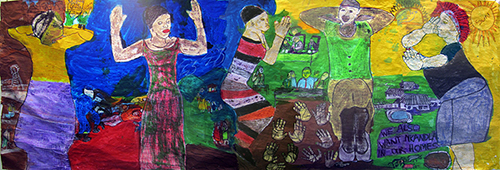Latest News Archive
Please select Category, Year, and then Month to display items
17 September 2018
Photo Charl Devenish
 Innocensia Mangoato’s research on using cannabis to reverse anticancer drug resistance has been awarded in the prestigious Women in Science Awards.
Innocensia Mangoato’s research on using cannabis to reverse anticancer drug resistance has been awarded in the prestigious Women in Science Awards.
“There’s this misconception among young people that science is difficult and that it’s somehow a man’s domain,” says Innocensia Mangoato, Masters student in Pharmacology, who has just been awarded in the prestigious Women in Science Awards by the Department of Science and Technology.
Cannabis research
Innocensia won in the Master’s Degree category for her research on the use of cannabis in reversing anticancer drug resistance. Her department had to apply for a special permit to grow cannabis for research and medicinal purposes.
“Her findings have already indicated a promising reversal of resistance to drugs in a variety of cancers. We plan to explore these results further in a possible PhD,” says her study leader, Prof Motlalepula Matsabisa.
Innocensia says she’s always had an interest in science, and initially wanted to study medicine. She ended up doing a BSc in Physiology and Genetics.
She hopes that her research will help government to develop a policy around the use of cannabis for medicinal purposes which could ultimately lead to developing cancer treatment with fewer side-effects.
Female mentors
“My mentor during my Honours studies was Dr Makhotso Lekhoa. Her passion for her field and her patience in conveying it to others really inspired me. We have some very powerful women in our Pharmacology Department,” says Innocensia.
Passion for science
“You know you’re passionate about your work when you find yourself going to the lab on Sunday afternoons!” she says. “I’m happy that I can be contributing to the knowledge production on this campus. And maybe one day I can be a mentor to other girls with that same passion for science.”
Panel to discuss: 'Speaking wounds: voices of Marikana widows through art and narrative' on Monday 27 July 2015
2015-07-24
The massacre of 34 mine workers at Marikana on 16 August 2012 had South Africans in uproar. But what remained, after the razor wire was rolled up and the camera crews left, were 34 widows engulfed in silent despair. That was until the Khulumani Support Group introduced them to the transformative power of art and storytelling. In the last installment of the Vice-Chancellor’s Lecture Series for this year, a panel of speakers will discuss these widows’ journey with the theme of ‘Speaking wounds: voices of Marikana widows through art and narrative’.
Panel
The panel will consist of members from the Khulumani Support Group that include Dr Marjorie Jobson (National Director), Nomarussia Bonase (National Organiser), and Judy Seidman (Sociologist and Graphic Artist). Nomfundo Walaza, who is the former CEO of the Desmond Tutu Peace Centre, will be the respondent.
Details of the event:
Date: Monday 27 July 2015
Time: 12:00
Venue: Chancellor's Room, Centenary Complex, Bloemfontein Campus
RSVP: Nomusa Mthethwa at Nomusam@ufs.ac.za (Members of the public are welcome to attend.)
Body maps
An art exhibition consisting of body maps created by the widows will also be on display. These paintings quietly portray the turmoil of their inner landscapes, their perceptions of the massacre, and the impact these events had on their lives.

Collaboration
The lecture series is hosted by Prof Pumla Gobodo-Madikizela, Senior Research Professor in Trauma, Forgiveness, and Reconciliation Studies at the University of the Free State (UFS), as part of a five-year research project funded by the Andrew W. Mellon Foundation. This installment of the lecture series is presented in collaboration with the UFS Institute for Reconciliation and Social Justice.